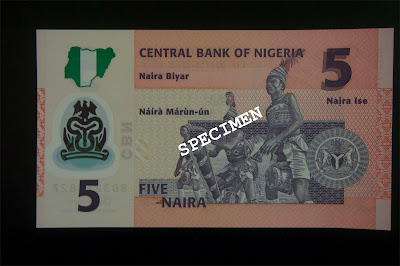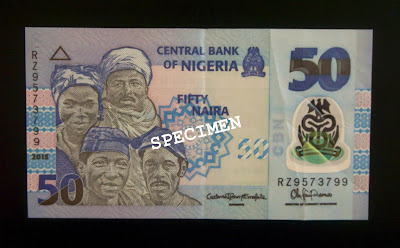Dollar, Yen, Pound, Euro, Schilling, Riyal, Dinar, Ruble, Krona, Rand, Taka, Rupiah, Rupee, Franc, Baht, Ringgit, Dong, Schlong....theirs is Naira (N, Nigerian Naira, NGN).
A 1/100 Naira is called Kobo, but I haven't seen it myself except in websites. You can google it, but for the sake of this posting...I will only show you the denomination which is generally very much in used.
Naira was introduced on January 1st, 1973 and over the years, some of the denomination remain and of course the design changed too. Currently, they have notes for N5, N20, N50, N100, N200, N500 and N1000. In the Central Bank of Nigeria's website mentioned about N10, but I don't have it.
On XE Currency App, which I use daily just to take a peek how's Malaysian Ringgit fares against the USD, Sing Dollar and Euro. So, according the app:
USD 1 = N 199
RM 1 = N 48
N 1 = RM 0.02
Five Naira (N5)
The person featured is Alhaji Sir Abubakar Tafawa Balewa (1912-1966). He was born in Tafawa Balewa, a town in Bauchi State. A teacher later turned politician, became the Prime Minister in 1957 and was at the post when Nigeria declared independence from UK in 1960.
The back illustrates the Nkpokiti dancers from South Eastern part of Nigeria
Twenty Naira (N20)
The person featured is the late Head of State (1975-1976), General Murtala Ramat Muhammad. Considered as the first national hero from was from Kano City. During his short reign, outlined the return to civilian rule in 1st October 1979 and masterminded the change of Federal Capital from Lagos to Abuja.
Assassinated on February 13th, 1976 in an abortive coup. The Murtala Muhammad International Airport in Lagos is named in his honour.
The back of the note featured a woman, Madam Ladi Kwali a well known potter who was made Doctorate and MBE (Member of the British Empire) in 1963 for her exploits in pottery making. Born in a Kwali Town in Federal Capital Territory, Abuja (from www.olufamous.com)
Fifty Naira (N50)
By far one of my favourite note. The ones circulated were not in good condition. I like its blue colour. This one was given by a friend.
Three men and a woman adorned the note. Some ornamental pattern and motifs incorporated in its design.
At the back of the note depicts a big catch by the local fisherman.
One Hundred Naira (N100)
The potrait of Chief Obafemi Awolow0 adorned the N100 note. A nationalist and political leader born in Ikenna, Ogun state.
Zuma rock (Gateway to Abuja), at the back of the note is a major landmark in Niger State; close to Federal Capital Territory, Abuja.
Two Hundred Naira (N200)
Alhaji Sir Ahmadu Bello is the person featured in this note. He was born in Sokoto and a prominent leader in the north alongside Alhaji Sir Abubakar Tafawa Balewa. Became the first premier of the Northern Nigeria. His greatest legacy was modernising and unification of the diverse people of Northern Nigeria. Assassinated in 1966 during a coup to topple the post-independent government.
The back of the note depicts agriculture commodity and livestock farming. Sorry, couldn't get any new ones. Have to make do with this one. The colour of this note is light green. Quite nice actually.
Five Hundred Naira (N500)
One of the most used denomination. Dr Nnamdi Azikiwe was the first President of the Federal Republic of Nigeria (1963-1966). The airport in Abuja is named in his honour.
At the back of the note is a picture of an off-shore oil-rig.
One Thousand Naira (N1000)
This is the highest denomination in circulation. Alhaji Aliyu Mai Borno (L) and Dr. Clement Isong (R) are featured in this note. Both are the first and second indigenous Governors of the Central Bank of Nigeria.
At the back of the note is the corporate Head Office of the Central Bank of Nigeria in Federal Capital Territory, Abuja, Nigeria.
One Hundred Naira (Centenary Celebration 1914-2014)
Still in circulation, this N100 note unveiled during the Centenary Celebration of Nigeria. The note still retains the potret of Chief Obafemi Awolowo.
At the back side of the note is the QR Code (quick response code) a digital communication feature that highlight and sources all information regarding the centenary. A short history of modern Nigeria, its leaders and currencies, past and future. Good info for me at least. I just love these sort of information and I think it was quite smart of the CBN to do so.
Anyway, money makes the world go round...some say. Regarding courtship, no money no honey... not money, but health is wealth to some.. money is the root of evil..the list goes on and on. You can never have enough of it, but too much of a good thing is also not good right? I hear you say....Aheh... yes indeed....
















solidworks crack
ReplyDelete360 total security crack
cleanmymac x crack